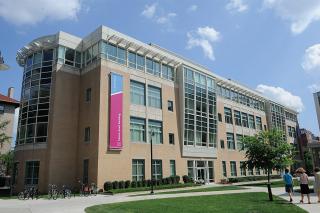The Counseling Center offers a variety of mental health services for Simmons students, and the Center's racially diverse practitioners are uniquely positioned to support the needs of BIPOC students.
When it comes to mental health and wellness on campus, the Counseling Center has students covered. The Center provides assessment, counseling, urgent care, and referrals to community providers. It also offers support groups and other outreach activities for undergraduate students, and select services are available to graduate students. In-person and telehealth services are available to Simmons students.
The Center hosts a large intern training program, and approximately half of its counselors are graduate trainees from schools in the area, including the Simmons School of Social Work. The team is comprised of social workers, mental health counselors, a psychologist, and a psychiatrist who can prescribe medications.

"Simmons endorses a feminist intersectional model," says Dr. Sherri Ettinger, Ph.D., LICSW, who serves as Director of the Counseling Center. "We are really able to think about the students in their context, and not use a pathologizing model of mental healthcare."
One significant aspect of the Counseling Center is its diverse composition. Most of the full-time clinical staff are women of color, and, in any given year, 40-50% of the interns are also BIPOC. Moreover, several of the Center's counselors identify as LGBTQ.
"We try to have a racial diversity on our staff that mirrors our population," says Dr. Ettinger, who notes that students of color are empowered to ask to see a clinician of color. "We can usually honor this, if requested, and I feel proud of Simmons that we are able to offer this."

The Counseling Center provides unique opportunities for BIPOC students to work with counselors of color. "It's rare and special to have a counseling center that has almost a majority of women of color as counselors," says Jamila Batts Capitman, Staff Counselor and Outreach Coordinator. "We are all invested in providing culturally competent and responsive care to students. As a clinician, I feel that this environment really supports students of color on a systemic level."
Capitman brings her group therapy and DEI experience to Simmons, working with trainees to develop support groups for specific demographics: Spectrum is designed for LGBTQIA+ students, Sister Circle welcomes Black women, and SAFE (Sex and Feeling Empowered) discusses all issues related to sex. The support groups typically meet once a week in-person, and the Center just started a group open to all first-years students.
"We have seen a lot of racial tension in recent years," notes Capitman. "Students have learned concepts related to identity, but they are now trying to embody and live it. This is something we have tried to help them navigate."
Dr. Ettinger adds that often "the best thing is connection and groups, but it can also be the hardest thing to do, because students may not be used to that. If we can get them to realize that their peers are having similar experiences, this can help."
In addition to racial unrest, the COVID-19 pandemic has affected students' mental health. "There has been a collective traumatization that we have all been through," says Capitman. "And now we feel like we are coming out on the other side of something that was shocking."
According to Dr. Ettinger, the pandemic "certainly contributed to a sense of isolation. For students who have already had mental health struggles, the isolation of COVID made things more difficult."
Despite the challenges that young people face, mental health practitioners at the Counseling Center have found Simmons students to be remarkably hopeful. This is one of the reasons why Simmons counselors find their work so rewarding. "It's an incredible opportunity to work with so many clients from so many different backgrounds," says Capitman. "It is also very inspiring. These people are full of hope."
Dr. Ettinger feels blessed to work with this age group, which encapsulates a time of transition and maturation. "I feel really privileged to watch them and witness their growth," she says.
Are you in need of a support system? Simmons has resources to help you. Please visit the Counseling Center and REEF (Resilience, Efficacy, and Empowerment through Foundational Support Services websites for more information. Graduate and online students can access mental health and other supportive services through the Student Assistance Program.

